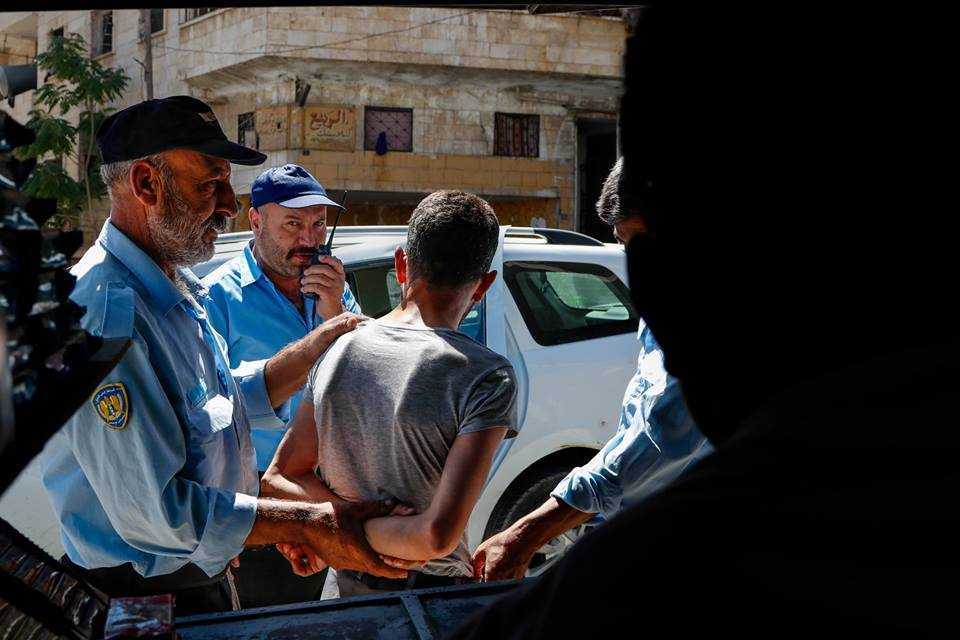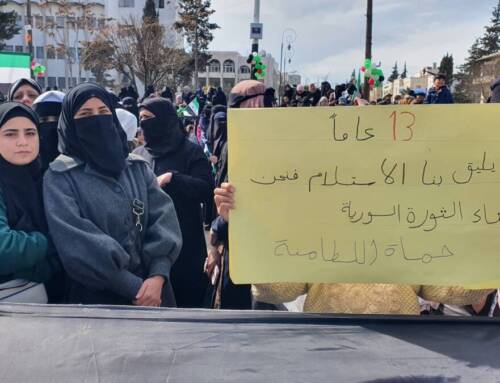‘Extremists will move to fill the vacuum’: Halt in funding, encroaching military advances leave future of Syria’s Free Police in doubt
Free Police officers arrest a drug dealer in Idlib in […]
10 September 2018

For the past six years in Syria’s rebel-held northwest, the Free Syrian Police has tried to maintain law and order in amongst armed clashes and shifting alliances between rebel factions.
Since its founding in 2012, the network of community police officers has been going after criminals and protecting civil institutions in areas of Idlib and Aleppo provinces where the rules are all too often determined by armed groups. The force’s approach to policing has been described as “policing by consent”: by building networks of trust among communities where the force works and, above all, refusing to carry weapons.
The work is coordinated by Adam Smith International, an organization that promotes government reform around the world, through their Access to Justice and Community Security (AJACS) initiative. The project has not been without its controversies. Reports from 2017 alleged that some of this funding had been inadvertently handed over to Idlib-based Islamist militias in the form of payoffs—revelations which led to a temporary freeze in UK government funding, until an official inquiry later determined the allegations were baseless and services resumed. Despite the controversy, the Free Police have been lauded for their unique successes in reducing crime and building cohesive communities throughout rebel-held areas of Syria. Ultimately, its supporters say, the force lessens the dependence of local communities on services and local governance structures provided by hardline groups like Hay’at Tahrir a-Sham (HTS).
Even so, the project’s almost exclusive reliance on funding from just five foreign governments has left it vulnerable to shifting political priorities. Ahead of what many expect to be an imminent pro-government offensive on Syria’s northwest, some donor countries appear to have turned away from the idea of further aiding Syrian civil society projects like the Free Police.
Last month, the British Foreign Office announced the end of its financial support for the AJACS initiative—which constituted some 30 percent of the group’s annual operating budget as of a year ago. The move is the latest in a sweeping round of funding cuts from Western governments that have hit local civil society hard in recent months.
Now threatened on one side by a possible all-out, pro-government campaign to retake the province, and dwindling financial resources on the other, the Free Police find themselves in an unprecedented period of uncertainty.
“Every one of these people will lose their job as a result of funding freezes, if we are not able to find an alternative source of support,” says Free Police chief Adeeb a-Shallaf, who has headed the force since he defected from the Syrian army five years ago.
In an interview with Syria Direct’s Mohammad Abdulssattar Ibrahim, a-Shallaf talks about the potentially existential threat posed by recent UK funding cuts, and the hardline elements who stand to benefit from the disappearance of the Free Police.
“Loss of support means leaving the arena for the Islamic police and extremist factions to fill the vacuum,” he says.
Free Police officers at the scene of a car accident in August. Photo courtesy of Idlib Free Syrian Police.
Q: How many people are currently employed with the Syrian Free Police, and how many people do you expect to lose their jobs due to these funding cuts?
There are 3,919 workers employed by the Free Police in Aleppo and Idlib, including 154 policewomen who serve in the field of women’s rights and children, and who receive monthly salaries. We have 54 centers in the countryside of western Aleppo and Idlib, and the Free Police serve more than 3.8 million civilians, including more than 750,000 who have been forcibly displaced.
Every one of these [employees] will lose their job as a result of funding freezes if we are not able to find an alternative source of support.
Q: What are the main responsibilities of the Syrian Free Police? How do their responsibilities differ from the security work conducted by local armed factions?
The work we do is the same as police anywhere in the world. This means fighting crime, implementing habeas corpus, [filing] judicial and executive memos, in addition to supporting the work of the civil defense [White Helmets], [and] securing and protecting baccalaureate exams.
We have nothing to do with factional disputes. We work as policemen, not intelligence officers.
Q: How is the Syrian Free Police funded? And how much of that funding comes from the British government?
Our financing began more than five years ago, in August 2013, [with support] from several countries—namely the US, Britain and three other European nations. We did not receive this support from them directly, but through an organization that distributed the funds. The first [organization] was ARK, then the Adam Smith Foundation and Creative Associates.
These companies coordinate the police work through the AJACS project, which directs the financial support for salaries, operating expenses, and supplying vehicles, machinery and equipment.
Q: When did you first hear about the funding freeze?
The first time we heard [of the cuts] was when President Trump announced the suspension of support for Syria’s north, and I immediately received a call from AJACS’s manager saying that he had received orders to stop the support completely. Although support was supposed to stop after that, we entered into negotiations with representatives from other supportive governments, who continued the funding. Britain stopped [funding] a month after Trump’s comments.
The rest of the countries were reluctant to stop support, but all ended support in September.
Q: What are the immediate effects of funding cuts to the Free Syrian Police?
There will be no immediate effects—we can continue operating for a period without this support, although of course the project will be weakened and the community will also be affected.
We also have what we call “community projects” implemented by AJACS inside Syria, which are carried out in the name of the Free Police. The projects have been [largely] successful. The idea is that in any village or area with a Free Police station, a committee of police and local dignitaries would be formed to develop service projects such as asphalting streets, setting up street-lighting, constructing sewage networks and drilling wells. We have worked on about 200 projects in Aleppo and Idlib.
People liked the Free Police. And they began to call for police stations to be opened in their areas. So the effect is not only on the police—it is also felt by the entire community [as well], since they could lose the projects we talked about.
Q: Are you currently looking for new sources of funding? What other options do you have at this point?
Of course. We’re reaching out to several countries, including the ones that were already supporting us—like Germany, Denmark and the Netherlands—but which stopped support because they were funding us through British contracts [that ceased].
Foreign representatives [of those countries] told us that they were disturbed by the suspension of support. At the end of the day though, the suspension in funding is a political decision.

Q: Do you think armed factions, hardline or otherwise, will move to fill the security vacuum left by the Syrian Free Police?
I think extremist factions are the ones that could try to seek out [opportunities] in Idlib now.
[Extremists] control the Salvation Government [a governing body supported by former Al-Qaeda affiliate HTS] and the Islamic police. As long as we are present, the Islamic police have no role, even though they have enormous potential [to grow]. I think they will move to fill the vacuum, or they will offer to have our members join them. I think that some of our elements will accept this, if loss of support means leaving the arena for the Islamic police and extremist factions to fill the vacuum.Q: Do you see a relationship between the halt in funding and talk of an upcoming campaign to retake Idlib?
I think that it points to the [high] probability of an attack on Idlib, unfortunately. This is what we realized after donors’ confusion when we asked them about the sudden, [unexplained] funding cut. Sometimes they’d give us reasons, but in the end they said that it’s international politics. I think they know an attack on Idlib is coming—that’s my feeling.
Q: Do you see a future for the Free Syrian Police if the Syrian army and pro-government forces retake northern Syria?
Even if reconciliation or negotiations were to happen, I personally couldn’t remain part of the Free Syrian Police under the shadow of the regime. I simply couldn’t. Maybe some of the factions will reconcile their status and join the army. But in terms of the Free Syrian Police, I rule this out.
If the regime—God forbid—retook Idlib, or northern Syria; or if the regime took the north and then suggested that the Free Syrian Police integrate into the regime’s police forces, I couldn’t accept this.








